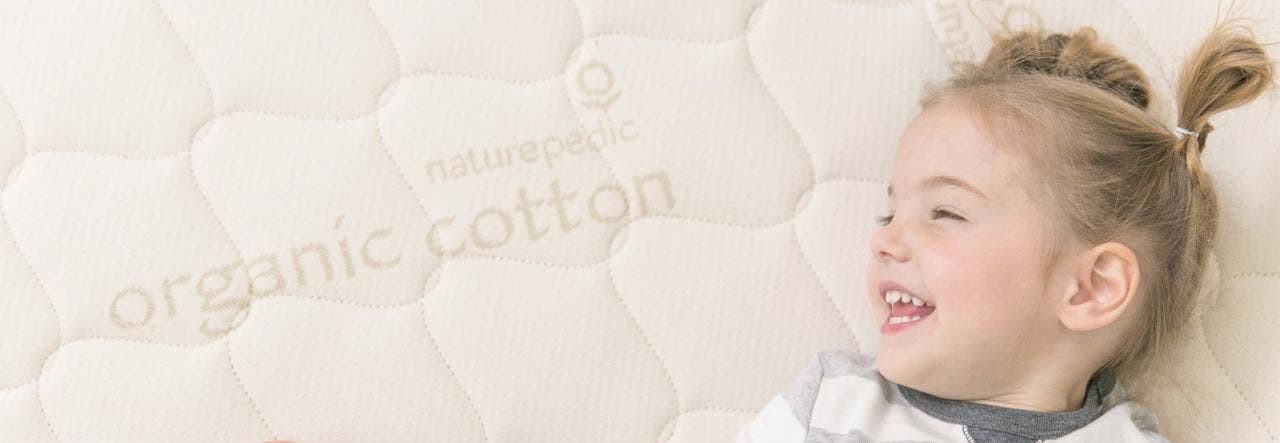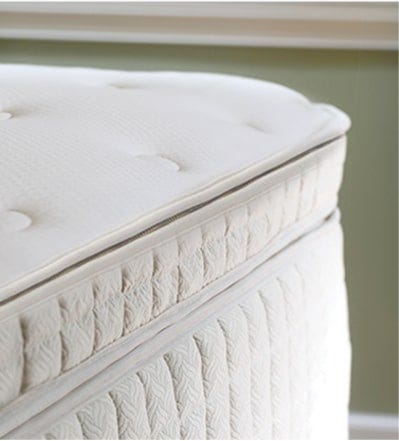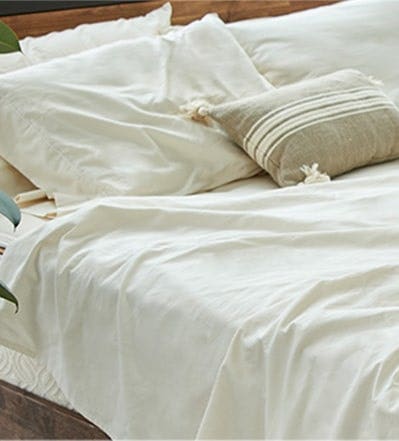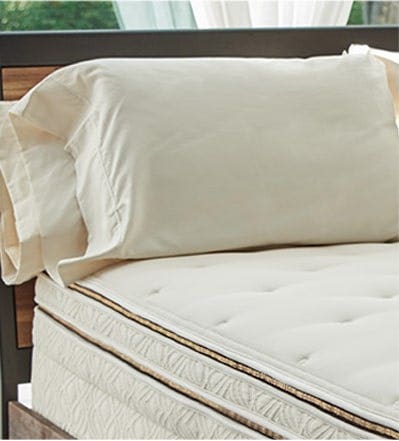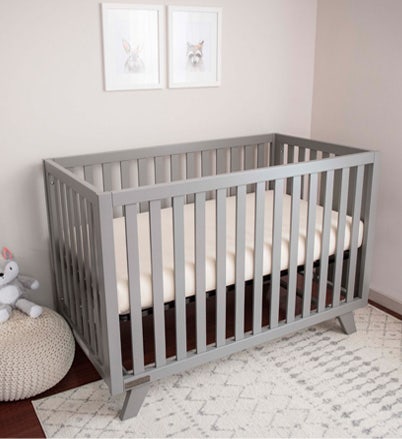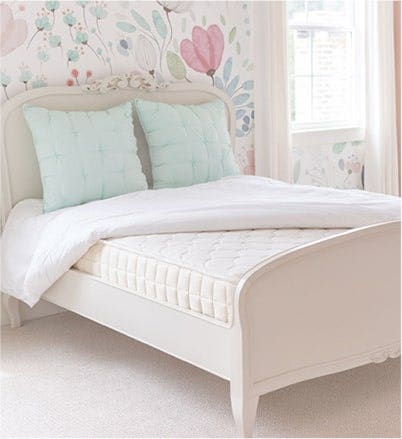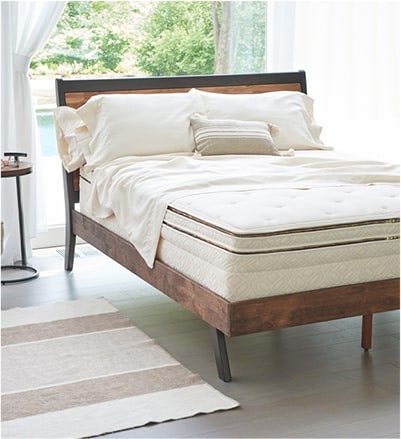Perhaps one of the most shocking things about traditional mattresses is the amount of harmful materials they contain. When you’re in the market for a new mattress that meets all of your expectations for comfort and quality, you might not be thinking about the materials (and chemicals) that went into the making of the mattress.
However, toxic chemicals are common in many mainstream mattresses. Often, these toxic chemicals will off-gas unacceptable levels of VOCs (volatile organic compounds), which can lead to a wide variety of symptoms such as headaches, difficulty breathing and dizziness, to name a few. In the worst-case scenario, some VOCs are even suspected or known carcinogens.
This is why it is extremely important to think carefully about the make-up of your mattress. To help protect you and your family from exposure to toxic chemicals while you sleep, it is safer to choose a certified organic mattress that uses safer, healthier alternatives to meet the same sleep and comfort standards.
Let’s look at some of the most common mattress materials that you should avoid and why you should avoid them.
1. Flame-Retardant Chemcials and Barriers
In many conventional mattresses, the materials that are used cause manufacturers to add chemical flame-retardants to meet flammability standards. One of the most common flame retardant chemicals that’s used to treat fabrics is antimony (i.e. antimony trioxide/pentoxide, sodium antimonate, and various halogen combinations). What’s shocking about the use of antimony in consumer products is that it usually contains arsenic, a known carcinogen.
Flame retardant chemicals have clear toxicity concerns and can have many adverse health effects, especially as the particles in the mattress break down over time and become airborne. Exposure to these substances has been demonstrated to cause adverse health effects such as:
- Irritation of the lungs, eyes and mucous membranes
- Effects on the central nervous system
- Reproductive issues
- Cancer
2. Synthetic Latex
Synthetic latex is regularly used by conventional mattress manufacturers because it is cheaper to produce than natural latex that is certified by the Global Organic Latex standard (GOLS) or Forest Stewardship Council® (FSC®). Made from two petroleum-based compounds (styrene and butadiene), synthetic latex can pose serious health risks – again from unacceptable levels of off-gassing VOCs. Chronic exposure to styrene in particular has been linked with a range of health consequences, including:
- Effects on the central nervous system
- Hearing loss
- Fatigue
- Depression
Formaldehyde
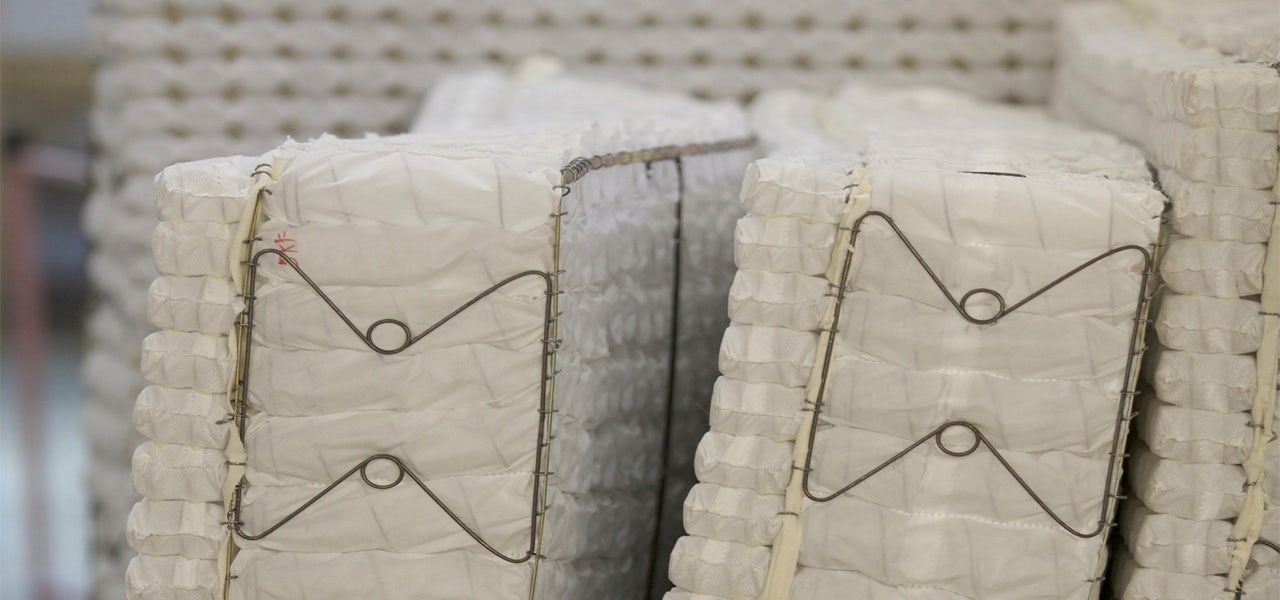

Formaldehyde is used in mattresses primarily because it is a component in some of the adhesives and resins that are used during the manufacturing process – often when assembling mattress coil systems. However, it's important to note that formaldehyde is classified as a carcinogen by various health organizations, and it can cause respiratory problems, skin irritation and other health issues, especially in high concentrations or with prolonged exposure. At Naturepedic, we have innovated a process where we manufacture glueless coils in-house from recycled steel, and we proudly make all of our mattresses without any glues or adhesives.
If you're ever concerned about formaldehyde in a mattress, you can looks for the UL Formadlehyde Free validation.
4. Vinyl/PVC
Vinyl is a commonly used as a shorthand name for polyvinyl chloride (PVC) plastic in a range of consumer products. However, vinyl is dangerous on two levels. First, some chemicals associated with PVC are recognized carcinogens. Second, the plasticizers that are traditionally used to soften the hard PVC plastic and make it flexible enough to use as mattress pads or protectors are phthalates. Phthalates (and their variants) are endocrine-disrupting chemicals that negatively impact human health, especially for developing babies and children. If a mattress claims to be waterproof, there is a good chance that it contains vinyl/PVC and phthalates.
How is Naturepedic a Safer, Healthier Alternative?
Since so many conventional mattresses contain these harmful chemicals in their materials and make-up, Naturepedic made it our mission to offer a safer, healthier, certified organic alternative that does not include anything on this list.
Not only are we certified to the strictest organic standards through the Global Organic Textile Standard (GOTS), but we take pride in being the leading organic mattress brand when it comes to transparency and safety. This includes having our mattresses vetted and certified by multiple third-party oragnizations, including:
- MADE SAFE® – a human health and ecosystem-focused product certifier
- GREENGUARD® Gold – certifies for low chemical emissions
- EWG VERIFIED® – a certification for health, transparency and good manufacturing processes
In fact, our entire factory is GOTS certified! It is our promise to you that we will always take care to eliminate as many harmful chemicals from our products as reasonably possibly, offering safer alternatives to improve the safety and health of your family. You can read more about our non-toxic approach here.
 BABY
BABY  KIDS
KIDS  ADULT
ADULT  LEARN
LEARN  STORES
STORES 